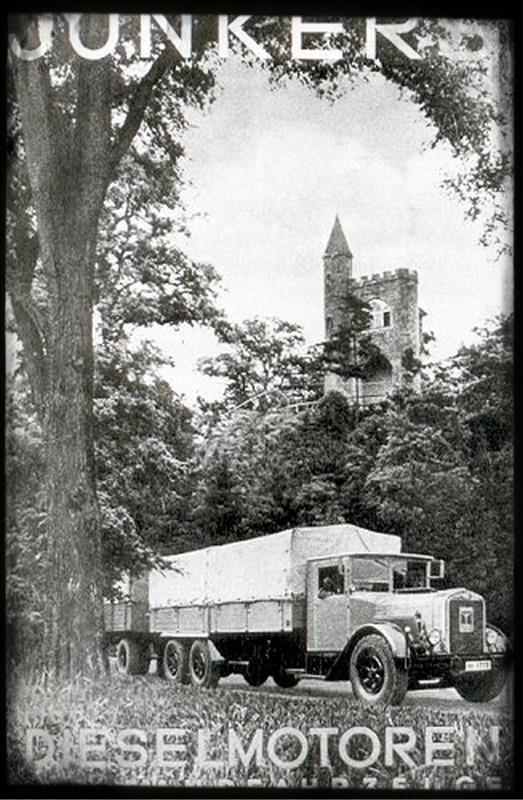Junkers Motorenbau GmbH Dessau
Founded:
Junkers Motorenbau GmbH, Dessau
27th November 1923 at Dessau by Hugo Junkers
Main Business:
Production of Stationary Oil Engines (HK-Series)
truck and locomotive engines (SA-Series)
ship and aircraft engines (L-, Jumo-Series)
Management Positions:
Yserentant - 1930, operational manager
Facilities:
Dessau
Koethen, Magdeburg since 1935
Company Development:
At the end of WWI the Junkers Motoren GmbH at Magdeburg was dissolved. The remains at Magdeburg were sent to Aachen, where oil engine research and constructions were continued at the Versuchsanstalt Prof. Junkers, Aachen. In 1923 the Versuchsanstalt reached a final stage of the stationary oil engine developement and there were good chances for a larger serial production of these engines, which were scalable for several types of applications. Therefore Junkers decided to establish a new production company for his oil engines at Dessau. It was formed as Junkers Motorenbau GmbH at Dessau on November 27th 1923. At the same time the Versuchsanstalt in Aachen was dissolved. Parts of this organisation were integrated into the Forschungsanstalt Prof. Junkers at Dessau. Other parts, like the stationary oil engine research departement were integrated into the new engine company, which became also responsible for the further developement of the oil engines during the following years.
It took further two years to standardsize the Aachen designed Haubenkolben engines into a scalable standard engine, which differs in the number of pistons and turnrate and volume depending on the type of application, the engine was used for. In 1925/26 Junkers Motorenwerke started with the initial production of the HK-Series engines. These engines were used for a wide area of applications. Especially the small HK65 engine was used by a lot of small workshops as a drive unit for their machineries. It was also widely used in agricultural areas as a mobile unit. Larger HK-engines were also used in smaller locomotives. The HK-Series were further developed into the SHK-Series, which were special engines for use in river boats. Since 1927 Junkers Motorenwerke also provided diesel engines for trucks and smaller boats. These SA/SB-Series engines were also available as scalable engines in two or three cylinder versions. The SA-series truck engines were the first convincing diesel engines used in larger vehicles and they proofed the advantage of a diesel engine against a standard petrol engined truck. Several truck manufacturers selected the Junkers truck engines for their models and produced these engines under license.

During the restructuring of the Junkers consortium in 1931 the oil engine section of the Junkers Motorenbau GmbH was transfered into an independent company called Junkers Diesel-Kraftmaschinen GmbH at Chemnitz. The oil engine patents, which still belonged to Hugo Junkers, were transfered to the Gesellschaft fuer Dieselkraftmaschinen also at Chemnitz. Like the Junkers-Thermo-Technik GmbH, Junkers intended to sell the Junkers Diesel-Kraftmaschinen GmbH to regain liquidity. Junkers Motorenbau GmbH fully concentrated on aircraft engine developements since then.
The research of Junkers aircraft engines already started in 1914 at the Versuchsanstalt at Aachen with the Mo 3. Since 1915/16 the Forschungsanstalt Prof. Junkers at Dessau continued the developement. In 1920 the Junkers Fo 2 and the L 1 represented the end of the WW I Junkers aircraft engine developement. However, due to the Allied restrictions upon Germany's aviation industry, the developement of these engines for aviation had to be stopped. Post war Junkers aircraft used the typical Benz or BMW engines, which were not very reliable. In 1923 Junkers and BMW signed a license agreement for a small serial production of the BMW III at Junkers Flugzeugwerke AG in Dessau. At the Forschungsanstalt in Dessau a further improved version of this BMW engine was developed as the Junkers L2. The serial production of this engine was handed over to the Junkers Motorenbau GmbH in 1923. It was followed by the Junkers L5 in 1925 and Junkers L8 in 1927 and finally by the Junkers L10/Jumo210 in 1931.
In 1926 Junkers also restarted his aircraft oil engine research with the Fo 3. In 1929 the Fo 4 became the first oil engine to be tested on an aircraft, which finally led to the Jumo 205 in 1932. The later was the first sucessfull aircraft diesel engine, which was used especially on long range routes.
During the financial collapse of the Junkers consortium in 1931, a major concern of the Junkers' shareholders was the fact, that Hugo Junkers was the legal owner of all patents. As these patents were essentially necessary for the Junkers companies, Junkers was forced to open his patents to his companies. Therefore in 1932 the Junkers Motoren Patentstelle GmbH was founded. Hugo Junkers intended to transfer all of his aircraft engine patents to this company. The Patentstelle GmbH on the other side should sign contracts with Junkers Motorenbau GmbH for the use of Junkers patent rights. Nevertheless, before Junkers transfered his patent rights to the Patentstelle GmbH, the financial collapse of the Junkers consortium was solved by the sale of the Junkers Thermo Technik GmbH to Robert Bosch and the transfer act was stopped.
When the Nazi Government was established in 1933, again Junkers got under pressure due to the open structure of the patent utilization within the Junkers consortium. Again Hugo Junkers thought to transfer his patent rights to the Patentstelle GmbH and to establish legal positions between the Patentstelle and the other Junkers companies. However the Nazi Government was not interested in the legal position itself. The major concern was to get Hugo Junkers out of his company and gain control about the Junkers' patents. Therefore Hugo Junkers was forced to transfer all of his aircraft engine patents to the Junkers Motorenbau GmbH in 1934. Hugo Junkers himself had to leave the company.
When the Junkers consortium was taken over by the Reich, a massive extension of the company was initialized. In 1934 the RLM put a developement order for 1000hpr engine at Junkers Motorenbau GmbH, which led to the Jumo 211, which was intended for the Junkers Ju88. The Jumo 210 was selected for the Messerschmitt Me 109. The massive demand for aircraft engines for the uprising Luftwaffe asked for increased production facilities. In 1935 the Junkers Motorenbau GmbH took over the former Flugzeugwerke facilities at Dessau. Already in January 1935 a new facility was opened in the nearby Koethen and in May 1935 the Junkers Motorenwerke at Magdeburg were opened. These facilities were responsible for the Jumo 210 and Jumo 211 production. The Junkers Motorenbau GmbH at Dessau remained as a pure developement facility.
In 1936 Koppenberg restructured the Junkers consortium. The Junkers Flugzeugwerke and the Junkers Motorenbau were integrated into the Junkers Flugzeug- und Motorenwerke AG on July 5th 1936.
introduced Aug 1996, transfered Dec 2017
http://hugojunkers.bplaced.net/
contents last updated 30 May 2004

